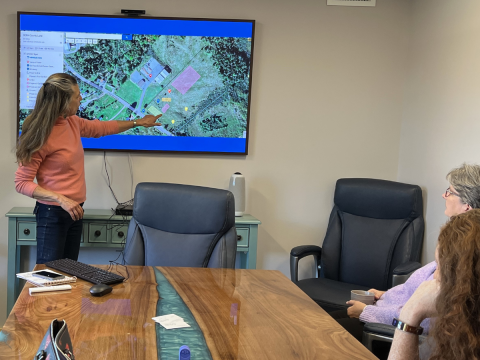Healthy Acadia to work with local correctional facilities
to help supply area food pantries with nutritious produce
Bangor, February 5, 2024 – Today USDA Rural Development Maine State Director Rhiannon Hampson announced a $270K grant for Healthy Acadia (healthyacadia.org). The funding will support the nonprofit's Downeast Restorative Harvest (DERH). This community garden project will benefit local food pantries and residents of nearby correctional facilities. Both the Washington County Jail and Maine Department of Corrections are partners in the work. USDA is investing the funds through its Community Facilities Direct Loan and Grant Program. Senator Susan Collins and Senator Angus King advocated for the funding through the congressionally designated spending process.
“USDA Rural Development believes in the potential this project holds,” said Director Hampson. “Turning an undeveloped piece of property into a place to nourish people is the kind of resilience that helps rural Maine to thrive. The act of growing food is one of optimism, and it is in many ways a path forward. Our hard-working team at USDA Rural Development Maine is grateful to be a part of projects such as this one, rebuilding lives and communities. The Biden-Harris Administration is committed to every individual in rural America – you will not be left behind. This Healthy Acadia project demonstrates that even when an individual is struggling, the Administration will patiently invest in their success.”
After breaking ground in 2023, the Downeast Restorative Harvest team began developing the county-owned property. During the first season, staff and volunteers did groundwork at the site. They built a driveway and parking area, laid out the garden beds, and planted cover crops. In the spring of 2024, they plan to plant the first food crops at the site. Eventually, residents of nearby correctional facilities will work in the gardens, helping to increase the scale of production.

The Maine Department of Corrections (MDOC) is nationally recognized for its success in growing andsourcing local foods using innovative, cost-effective strategies. MDOC Commissioner Randy Liberty is an advisor to the DERH community garden project. Plans for the garden include MDOC residents expanding their farming and gardening skills at the site and helping to grow food for area food pantries. “The Maine Department of Corrections is committed and excited to work with our community partners with this ground-breaking project,” according to Commissioner Liberty. “We recognize that through our combined efforts we can achieve much. I have been very pleased with the success of this project thus far and look forward to watching the gardens flourish.”
Healthy Acadia plans to foster collaboration between members of the recovery community, residents of area correctional facilities, University of Maine Cooperative Extension educators, and others. Food grown at the DERH gardens will be used at the Washington County jail and donated to local food pantries. Participating inmates will learn practical life and employment skills while growing nutritious food for neighbors in need. “There is nothing more important than ensuring our fellow Mainers have access to healthy, fresh, vegetables,” said Commissioner Liberty.
USDA Rural Development’s Community Facilities Direct Loan and Grant Program offers funding options to develop essential community facilities in rural areas. Other recent grants supported Wabanaki Health and Wellness, the Center for the Advancement of Rural Living, Piscataquis Regional Food Center, and Penobscot Valley Hospital. For more information about Maine’s Community Facilities programs, please contact Bob Nadeau, Community Programs Director, USDA Rural Development, at 207-990-9124 or robert.nadeau@usda.gov.
###
USDA is an equal opportunity provider, employer, and lender.
